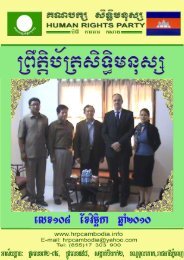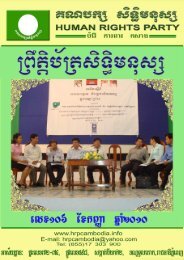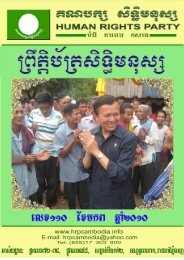Losing Ground - Human Rights Party.
Losing Ground - Human Rights Party.
Losing Ground - Human Rights Party.
You also want an ePaper? Increase the reach of your titles
YUMPU automatically turns print PDFs into web optimized ePapers that Google loves.
<strong>Losing</strong> <strong>Ground</strong><br />
strategy to divide and conquer by refusing to negotiate with<br />
all four villages at once. This is a common strategy employed<br />
by private interests and local authorities in land disputes,<br />
according to lawyers for the Community Legal Education<br />
Center (CLEC).<br />
Because of his lead role in the protests, Mr. Keth no longer<br />
sleeps at home: he is afraid he could be arrested or killed. “I<br />
worry that there will be a moto accident or that a burglar will<br />
come to the house at night.” Such “accidents” have happened<br />
before to activists in Cambodia.<br />
“I am making myself sick and anxious. I think and I think<br />
of how to solve this problem,” he said. “I shouldn’t have to be<br />
doing this all myself. It is the village chief and the commune<br />
leaders who should fight for us.”<br />
Village and commune officials around the country complain<br />
that they often don’t, or can’t, get involved because they are<br />
beholden to the political party.<br />
The company made the two biggest of the four villages<br />
an offer in March 2009 to return about 300 hectares, but<br />
the residents received nothing in writing and doubt the<br />
sincerity of the offer. Although the CLEC represents them<br />
on the criminal charges, there is no one to advise them<br />
in negotiations. Lawyers say that unless the land issue is<br />
resolved the criminal charges likely will hang over the men<br />
for years.<br />
“It’s a real concern. These criminal charges in civil<br />
land disputes are becoming common. It’s a new way of<br />
intimidating and threatening village residents,” said Yeng<br />
Virak, CLEC executive director.<br />
The four men’s lives are on hold. They live in fear of arrest.<br />
And no one is sure how long the four villages can withstand<br />
the pressure from the company and court.<br />
Besides Mr Keth, there are three other accused, being Van<br />
Vy, 36, Rath Kowet, 23 and Chheun Chan, 32.<br />
Mr. Kowet said he used to travel freely around the district<br />
taking odd jobs but is now afraid to leave for fear of the<br />
police and the legal system – the very system that is meant<br />
to uphold protections for people. He spends his days hanging<br />
out in his tiny village watching others play volleyball. He<br />
is engaged to marry, but is unsure of the future. He lives<br />
with his parents and is unclear when that might change. “I<br />
am worried because I haven’t made any mistakes. I just went<br />
with other villagers to stop the bulldozers and then they<br />
accused us,” said Mr. Kowet.<br />
Rubber boom<br />
Rubber trees thrive in the red soil of northeast Cambodia<br />
and in recent years plantations owned by foreign and local<br />
investors have cropped up all along the main highway leading<br />
north from Kampong Cham to Laos.<br />
The Kratie Governor signed several Economic Land<br />
Concessions in 2008, after the national government<br />
authorized provincial authorities to sign relatively small<br />
land concessions under 1,000 hectares. This right has since<br />
been removed, and provincial governors no longer have the<br />
authority to issue concessions.<br />
The Governor leased 769 hectares of indigenous lands<br />
in four villages to CIV Development Company on May 27,<br />
2008. The ELC did not comply with either the 2001 Land<br />
Law or later sub-decrees that protect indigenous lands and<br />
was illegal on multiple grounds, said CLEC lawyers.<br />
They said the ELC violates the provisions of the Land Law<br />
that protect indigenous lands by barring their conversion<br />
to private land. It also violates provisions of the 2005 Sub-<br />
Decree on ELCs that are supposed to protect indigenous<br />
people’s rights to their ancestral lands by including them<br />
in the consultation process and conducting social and<br />
environmental impact assessments before a concession is<br />
granted.<br />
The company’s impact assessments consisted of consulting<br />
only with officials, not the residents, according to the village<br />
people and their lawyers.<br />
The lawyers said the criminal charges of robbery and<br />
Forced Evictions and Intimidation in Cambodia<br />
39






